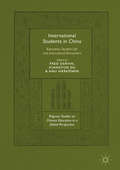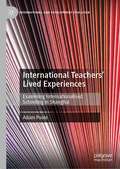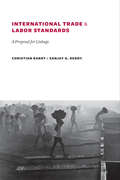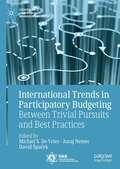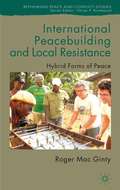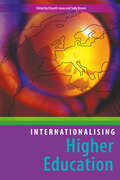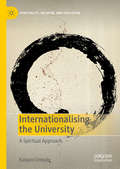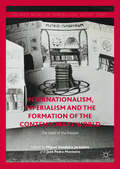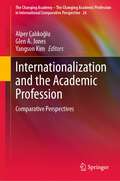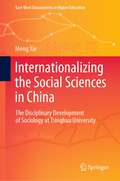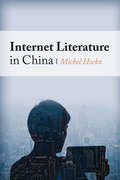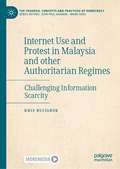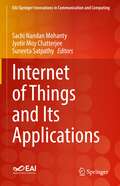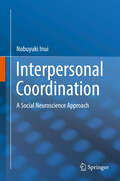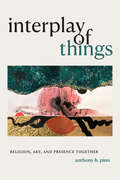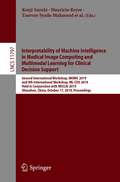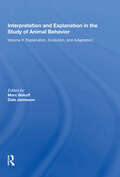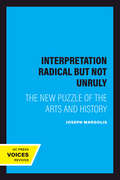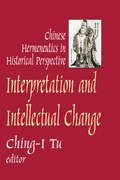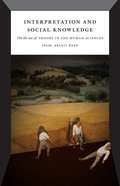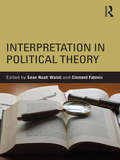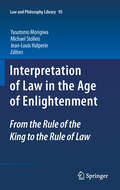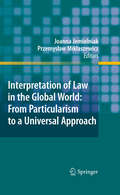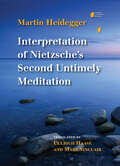- Table View
- List View
International Students in China: Education, Student Life and Intercultural Encounters (Palgrave Studies on Chinese Education in a Global Perspective)
by Fred Dervin Xiangyun Du Anu HärkönenAs the number of international students in Chinese higher education increases steadily, this volume is one of the first to focus on their many and varied experiences. With contributions focusing on such topics as intercultural adaptation, soft power and interculturality, language learning strategies and the intercultural, and transformations in perspective, this volume provides the reader with a broad overview of the latest advances in the field of interculturality and study abroad. While the book will appeal to a global audience of researchers, practitioners and students with an interest in Chinese higher education, it will also be of interest to all those who remain intrigued by conceptual and methodological issues of interculturality.
International Teachers’ Lived Experiences: Examining Internationalised Schooling in Shanghai (International and Development Education)
by Adam PooleThis book explores the emerging and under-researched phenomenon of internationalised schooling in China. It focuses on a group of “accidental” teachers who fell into teaching through happenstance or necessity, a group of teachers increasingly seeking refuge in Chinese Internationalised Schools. Chinese Internationalised Schools cater to an affluent middle class in China, offering some form of international curriculum which is taught by host country Chinese nationals and expatriate teachers. Chapters focus on three dimensions of teachers’ lived experiences of working in these schools: the intercultural, which explores teachers’ negotiations of intercultural teacher identities; the precarious, which highlights the struggles they might face at work; and the resilient, which illustrates how teachers survive—and even thrive—in the position. The author identifies a complex interplay between surviving and thriving, giving rise to the concept of “sur-thrival.”
International Trade and Labor Standards: A Proposal for Linkage
by Sanjay G. Reddy Christian BarryIn this book, Christian Barry and Sanjay G. Reddy propose ways in which the international trading system can support poor countries in promoting the well-being of their peoples. Reforms to the trading system can lessen the collective-action problem among poor countries, increasing their freedom to pursue policy that better serves the interests of their people.
International Trends in Participatory Budgeting: Between Trivial Pursuits and Best Practices (Governance and Public Management)
by Michiel S. De Vries Juraj Nemec David ŠpačekThis book analyses the participatory budgeting practice as it has evolved in evaluated countries, focusing on what is substantially at stake concerning the budget and issues involved, the actual participation, the way such processes are organised and administered, and the outcomes of such processes. It concludes that participatory budgeting in selected European countries is far away from the level of ‘best practice’, but that all experiences are not just trivial pursuits. The information collected serves to check, to what extent participatory budgeting as practiced in the countries involved presents a real attempt to change municipal budgets towards addressing the needs of marginalized groups and to improve decision-making based on local democracy and participation, or whether these processes as such are to be judged to be more important than any output and outcomes. The practices can neither be seen as a process of policy diffusion nor as a process of policy mimesis. The terminology of participatory budgeting remains, but the tools to achieve the goals resulted only in marginal changes in the status quo in municipalities in European countries practicing participatory budgeting, instead of resulting in radical changes to increase spending in favor of marginalized groups.Chapter 15 'Unraveled Practices of Participatory Budgeting in European Democracies' is available open access under a CC BY 4.0 license.
International peacebuilding and local resistance
by Roger Mac GintyInternational Peacebuilding and Local Resistance adds to the active debates and critiques of internationally-supported peace interventions. Using the case studies of Afghanistan, Iraq, Bosnia, Lebanon and Northern Ireland, Roger Mac Ginty dissects peace interventions along the themes of security, statebuilding and civil society as well as economic and constitutional reform. He proposes using the concepts of hybridity and hybridization to understand the dynamics in societies undergoing transition. Particular attention is paid to the ability of local communities to resist, subvert and exploit international actors. This book is part of a developing and radical critique of aspects of international peacebuilding. It argues that peace should not be discussed timidly, and that local, traditional or indigenous approaches to peacemaking should not be romanticised.
Internationalising Higher Education
by Sally Brown Elspeth JonesWith increasing numbers of international students, this book explores how best to broaden the approaches to learning and teaching in the higher/further education environment. Rather than seeing internationalization as a problem to be addressed, this text embraces the opportunities for the enrichment of the learning environment through a values-driven approach to internationalization. Taking a positive and practical approach to internationalizing higher education, the book considers a range of questions about how to bring in global perspectives to the learning environment and education provision. Packed with case studies and vignettes from around the globe, the book proposes that the international student lies at the heart of the university as a source of cultural capital and intentional diversity, enriching the learning experience, enhancing staff experience and building a more powerful learning community.
Internationalising the University: A Spiritual Approach (Spirituality, Religion, and Education)
by Kalyani UnkuleThis book takes a critical look at the internationalisation of higher education and argues for the importance of grounding education in spiritual perspectives. Using spiritual traditions to review the practices, programmes, and philosophies of learning that internationalise universities, the author proposes a paradigm for internationalisation that respects other ways of knowing. This focus seeks to decolonize knowledge and promote intercultural understanding, as well as help students achieve holistic personal development while studying abroad.
Internationalism, Imperialism and the Formation of the Contemporary World
by Miguel Bandeira Jerónimo José Pedro MonteiroThis volume offers innovative insights into and approaches to the multiple historical intersections between distinct modalities of internationalism and imperialism during the twentieth century, across a range of contexts. Bringing together scholars from diverse theoretical, methodological and geographical backgrounds, the book explores an array of fundamental actors, institutions and processes that have decisively shaped contemporary history and the present. Among other crucial topics, it considers the expansion in the number and scope of activities of international organizations and its impact on formal and informal imperial polities, as well as the propagation of developmentalist ethos and discourses, relating them to major historical processes such as the growing institutionalization of international scrutiny in the interwar years or, later, the emerging global Cold War.
Internationalization and the Academic Profession: Comparative Perspectives (The Changing Academy – The Changing Academic Profession in International Comparative Perspective #24)
by Glen A. Jones Alper Çalıkoğlu Yangson KimThis book makes a major contribution to the scholarship on internationalization in higher education by focusing on the perceptions and experiences of the academic profession in a comparative perspective. Drawing from data collected by the Academic Professions in the Knowledge-based Society (APIKS) project, the contributors to this volume are uniquely positioned to explore the impact and implications of internationalization on those who play the central role in the teaching and research functions of higher education: the professoriate. The core chapters address issues such as the roles of gender, discipline, and career stage in the international activities of academics in different countries, national differences in the perceptions and behaviors of university faculty in the internationalization of teaching, and of research within higher education systems on the perceptions and behaviors of academics. Each of these chapters draw on the existing research literature in these thematic areas as a foundation for the systematic analysis of the international APIKS dataset to illuminate and discuss key findings. This book offers a highly original and unique contribution to the study of internationalization in higher education because its editors and contributors, as participants in the APIKS project, have been able to raise and address key research questions using comparative international empirical data on the academic profession that has never before been available. Given the tremendous importance of internationalization and the global dimension of higher education, this volume offers unique, distinctive insights on the implications of internationalization for the academic profession and the very different ways in which these transformations are understood by academics both within and between systems.
Internationalizing the Social Sciences in China: The Disciplinary Development of Sociology at Tsinghua University (East-West Crosscurrents in Higher Education)
by Meng XieThe current social reality and changing global forces and spaces are inspiring the rethinking, refining, and re-empowering of the world social sciences to broach the frontiers of human knowledge, enhance mutual understanding across cultures and civilizations, and shape a better world. Taking Tsinghua University’s sociology as a case, this book concentrates on how internationalization shapes disciplinary development in a global context of asymmetrical academic relations. This inquiry is set amidst China’s dramatic economic, social, political, and cultural transformations, as well as the institutional reforms in this Chinese flagship university. This book seeks to probe how Chinese and Western knowledge, institutions, and cultures are integrated in the ongoing process of internationalization and concentrates on the disciplinary evolution of Tsinghua’s sociology—intellectually, institutionally, and culturally—drawing on top-down higher education policy and bottom-up perceptions and experiences of Tsinghua’s social scientists. This book highlights that higher education internationalization is an evolving process whose advanced phase would require Chinese social scientists to bring China to the world. It is time for Tsinghua University to reassess the long-term impact of internationalization on its academic disciplines and provide sufficient support for the development of the social sciences.This book will attract academics, practitioners, and postgraduate students interested in higher education internationalization, international academic relations, global constellation and distribution of academic power, academic knowledge production, and the development and intellectual influences of the Chinese social sciences.
Internet Literature in China
by Michel HockxRanging from the self-consciously avant-garde to the pornographic, web-based writing has introduced innovative forms, themes, and practices into Chinese literature and its aesthetic traditions.
Internet Use and Protest in Malaysia and other Authoritarian Regimes: Challenging Information Scarcity (The Theories, Concepts and Practices of Democracy)
by Kris RuijgrokThis book investigates the impact of internet use on anti-government protesting under authoritarian rule. By breaking up the causal chain into various steps, it provides a thorough and nuanced understanding of internet’s role in different stages of the mobilization process. It argues that the impact of internet use on anti-governmental protesting differs per step in the ‘mobilization chain’, and also that the effect depends on both the on- and offline repression of the regime, as well as on the type of internet that is available. While staying far away from any technologically deterministic claims about the internet, the book demonstrates that the internet especially plays an important role in the early stages of the mobilization process: By exposing citizens to alternative political information online, internet users are more likely to become sympathetic towards anti-governmental protest movements.
Internet of Things and Its Applications (EAI/Springer Innovations in Communication and Computing)
by Jyotir Moy Chatterjee Suneeta Satpathy Sachi Nandan MohantyThis book offers a holistic approach to the Internet of Things (IoT) model, covering both the technologies and their applications, focusing on uniquely identifiable objects and their virtual representations in an Internet-like structure. The authors add to the rapid growth in research on IoT communications and networks, confirming the scalability and broad reach of the core concepts. The book is filled with examples of innovative applications and real-world case studies. The authors also address the business, social, and legal aspects of the Internet of Things and explore the critical topics of security and privacy and their challenges for both individuals and organizations. The contributions are from international experts in academia, industry, and research.
Interpersonal Coordination: A Social Neuroscience Approach
by Nobuyuki InuiThis book explores the fascinating area of interpersonal coordination in force production tasks, outlining the author’s extensive research to date and presenting stimulating new perspectives. The purpose is to provide a detailed exposition of current understanding of the science behind interpersonal joint action. Readers will find clear explanation of concepts from social cognition and neuroscience that are key to an understanding of the field, including the social brain hypothesis, the mirror neuron system, and joint action, as well as other relevant background information. The author then proceeds to present an overview of recent original studies on interpersonal movement coordination performed at his laboratory in Japan. These studies provide insights into such issues as complementary and synchronous force production in joint action, bidirectional transfer between joint and solo actions, and motor control hierarchy in joint action involving bimanual force. They also set the direction for integration of knowledge of physical properties and social cognition. The book will be of interest for researchers and graduate students in all areas of the biomedical sciences.
Interplay of Things: Religion, Art, and Presence Together
by Anthony B. PinnIn Interplay of Things Anthony B. Pinn theorizes religion as a technology for interrogating human experiences and the boundaries between people and other things. Rather than considering religion in terms of institutions, doctrines, and creeds, Pinn shows how religion exposes the openness and porousness of all things and how they are always involved in processes of exchange and interplay. Pinn examines work by Nella Larsen and Richard Wright that illustrates an openness between things, and he traces how pop art and readymades point to the multidirectional nature of influence. He also shows how Ron Athey's and Clifford Owens's performance art draws out inherent interconnectedness to various cultural codes in ways that reveal the symbiotic relationship between art and religion as a technology. Theorizing that antiblack racism and gender- and class-based hostility constitute efforts to close off the porous nature of certain bodies, Pinn shows how many artists have rebelled against these attempts to counter openness. His analyses offer a means by which to understand the porous, unbounded, and open nature of humans and things.
Interpretability of Machine Intelligence in Medical Image Computing and Multimodal Learning for Clinical Decision Support: Second International Workshop, iMIMIC 2019, and 9th International Workshop, ML-CDS 2019, Held in Conjunction with MICCAI 2019, Shenzhen, China, October 17, 2019, Proceedings (Lecture Notes in Computer Science #11797)
by Ben Glocker Kenji Suzuki Mauricio Reyes Tanveer Syeda-Mahmood Hayit Greenspan Anant Madabhushi Roland Wiest Eth Zurich Yaniv GurThis book constitutes the refereed joint proceedings of the Second International Workshop on Interpretability of Machine Intelligence in Medical Image Computing, iMIMIC 2019, and the 9th International Workshop on Multimodal Learning for Clinical Decision Support, ML-CDS 2019, held in conjunction with the 22nd International Conference on Medical Imaging and Computer-Assisted Intervention, MICCAI 2019, in Shenzhen, China, in October 2019. The 7 full papers presented at iMIMIC 2019 and the 3 full papers presented at ML-CDS 2019 were carefully reviewed and selected from 10 submissions to iMIMIC and numerous submissions to ML-CDS. The iMIMIC papers focus on introducing the challenges and opportunities related to the topic of interpretability of machine learning systems in the context of medical imaging and computer assisted intervention. The ML-CDS papers discuss machine learning on multimodal data sets for clinical decision support and treatment planning.
Interpretation And Explanation In The Study Of Animal Behavior: Volume I, Interpretation, Intentionality, And Communication
by Ph.D. BekoffPeople have long been fascinated, not just by the behaviour of non-human animals, but by the problem of how this behaviour is to be interpreted and explained. This is one of two volumes of original essays on the cognitive and emotional dimensions of non-human minds and the relationship of natural minds to behaviour. The essays also address questions concerning the meaning and significance of consciousness; animal intelligence, awareness and emotions; behavioural plasticity, flexibility and constraints on understanding animal minds; and the structure of explanation in the study of behaviour.
Interpretation Radical but Not Unruly: The New Puzzle of the Arts and History
by Joseph MargolisWith this challenging work, Joseph Margolis continues the project begun in The Flux of History and the Flux of Science (California, 1993). Tackling one of philosophy's master themes, he develops the controversial thesis that the world is a flux. Here he applies this doctrine to Western theories of history and the interpretation of cultural phenomena—offering the first sustained analysis of the logic, methodology, and metaphysics of interpretation committed to a thoroughgoing relativism and the historicized structure of cultural phenomena. Versed in Anglo-American and Continental philosophy, Margolis draws on the best views of Western philosophy to investigate a topic regularly ignored in that tradition. The result is the surprising synthesis of two historically antipathetic approaches to philosophy.
Interpretation and Intellectual Change: Chinese Hermeneutics in Historical Perspective
by Ching-I Tu"This volume deals with the development of Chinese hermeneutics, or exegetic systems, from their beginnings to the twentieth century. The contributors address critical issues in the study of Chinese hermeneutics by focusing on key periods during which the hermeneutic tradition in China underwent significant changes.The volume is divided into six parts, corresponding to the six major periods of intellectual change in traditional and contemporary China. Part 1 considers the foundational period of Chinese hermeneutics, examining Confucian classics such as the Analects, Mencius, and the Book of Odes. Part 2 traces the broadening of the hermeneutic tradition from Confucian classics to the military canon, political discourse, astronomy, and Buddhist exegesis from the Han to the Chinese Middle Ages. In Part 3 the focus is on Zhu Xi's monumental synthesis and redefinition of the Confucian tradition at the beginning of the early modern period. His vision of Confucian thought remained influential throughout the imperial period, and his interpretations of the Confucian classics became state orthodoxy starting with the thirteenth century. Part 4 focuses on this challenge and discusses the intellectual changes that took place during the late imperial period and their profound effects on Chinese hermeneutics. Part 5 documents the challenges to traditional Chinese hermeneutics in the modern era and the emergence of a new, critical hermeneutics in the beginning of the twentieth century. The volume concludes with Part 6, which explores Chinese hermeneutics from a comparative perspective and identifies its distinctive features.The understanding of Chinese hermeneutics gained from these essays is that of a dynamic plurality of traditions that has endured into the twentieth century and continues to shape contemporary intellectual debates."
Interpretation and Social Knowledge: On the Use of Theory in the Human Sciences
by Isaac Ariail ReedFor the past fifty years anxiety over naturalism has driven debates in social theory. One side sees social science as another kind of natural science, while the other rejects the possibility of objective and explanatory knowledge. Interpretation and Social Knowledge suggests a different route, offering a way forward for an antinaturalist sociology that overcomes the opposition between interpretation and explanation and uses theory to build concrete, historically specific causal explanations of social phenomena.
Interpretation and Social Knowledge: On the Use of Theory in the Human Sciences
by Isaac Ariail ReedFor the past fifty years anxiety over naturalism has driven debates in social theory. One side sees social science as another kind of natural science, while the other rejects the possibility of objective and explanatory knowledge. Interpretation and Social Knowledge suggests a different route, offering a way forward for an antinaturalist sociology that overcomes the opposition between interpretation and explanation and uses theory to build concrete, historically specific causal explanations of social phenomena.
Interpretation in Political Theory
by Clement Fatovic Sean Noah WalshTheorists interested in learning more about any given interpretive approach are often required to navigate a dizzying array of sources, with no clear sense of where to begin. The prose of many primary sources is often steeped in dense and technical argot that novices find intimidating or even impenetrable. Interpretation in Political Theory provide students of political theory a single introductory reference guide to major approaches to interpretation available in the field today. Comprehensive and clearly written, the book includes: A historical and theoretical overview that situates the practice of interpretation within the development of political theory in the twentieth century. Chapters on Straussian esotericism, historical approaches within the Cambridge School of interpretation, materialist approaches associated with Marxism, the critical approaches associated with varieties of feminism, Greimassian semiotics, Foucaultian genealogy, the negative dialectics of Theodor Adorno, deconstruction as exemplified by Jacques Derrida and Paul de Man, and Lacanian psychoanalysis. An exposition of the theoretical and disciplinary background of each approach, the tools and techniques of interpretation it uses, its assumptions about what counts as a relevant text in political theory, and what it considers to be the purpose or objective of reading in political theory. A reading of Thomas Hobbes’s Leviathan to illustrate how each approach can be applied in practice. A list of suggestions for further reading that will guide those interested in pursuing more advanced study. An invaluable textbook for advanced undergraduates, graduate students, and even seasoned scholars of political theory interested in learning more about different interpretive approaches.
Interpretation of Law in the Age of Enlightenment
by Michael Stolleis Yasutomo Morigiwa Jean-Louis HalperinA collaboration of leading historians of European law and philosophers of law and politics identifying and explaining the practice of interpretation of law in the 18th century. The goal: establishing the actual practice in the Age of Enlightenment, and explaining why this was the case. The ideology of the Age was that law, i.e., the will of the sovereign, can be explicitly and appropriately stated, thus making interpretation redundant. However, the reality was that in the 18th century, there was no one leading source of national law that would be the object of interpretation. Instead, there was a plurality of sources of law: the Roman Law, local customary law, and the royal ordinance. However, in deciding a case in a court of law, the law must speak with one voice. Hence, interpretation to unify the norms was inevitable. What was the process? What role did justification in terms of reason, the hallmark of the Enlightenment, play? These are some of the questions addressed.
Interpretation of Law in the Global World: From Particularism to a Universal Approach
by Przemyslaw Miklaszewicz Joanna JemielniakThe volume examines the impact of applying transnational rules on the repertory, methods and practice of legal interpretation. It scrutinizes how globalization processes in law - those reaching top-down (such as European law), as well as those developing bottom-up (such as the new lex mercatoria and international commercial arbitration) - influence the often highly innovative use of various methods of legal rendition. It also examines to what extent they affect supranational and domestic decision-making. Capturing the current development of universalizing tendencies in legal interpretation, the book offers both an extensive theoretical background and thorough studies on adjudicatory practice in such fields as European and constitutional law, international business law and arbitration or criminal law.
Interpretation of Nietzsche's Second Untimely Meditation (Studies in Continental Thought)
by Martin HeideggerA “readable and fluent” translation of a work that demonstrates a crucial shift in Heidegger’s approach to Nietzsche in the late 1930s (Phenomenological Reviews).In Nietzsche’s Second Untimely Meditation, Martin Heidegger offers a radically different reading of a text that he had read decades earlier. This evolution in his relationship with Nietzsche has a significant impact on his understandings of the differences between animals and humans, temporality and history, and the Western philosophical tradition developed.With his new reading, Heidegger delineates three Nietzschean modes of history, which should be understood as grounded in the structure of temporality or historicity. He also offers a metaphysical determination of life and the essence of humankind. Despite the fragmentary and disjointed quality of the original lecture notes that comprise this text, Ullrich Hasse and Mark Sinclair deliver a clear and accessible translation.
